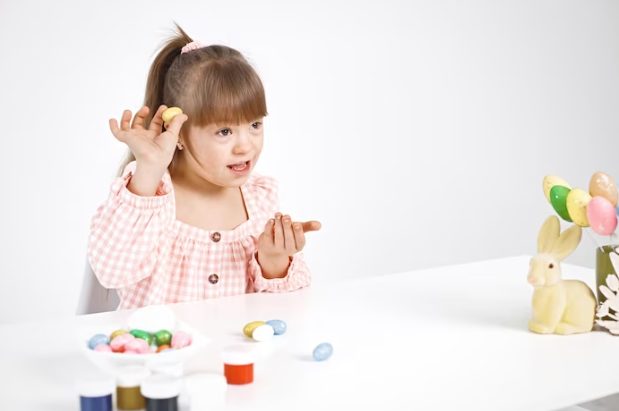
As a parent or caregiver of a child with autism, you play a valuable role in supporting and nurturing their development. And when it comes to caring for girls with ASD, it’s of utmost importance to recognize and address their unique needs. Autism, a neurodevelopmental disorder, affects children regardless of gender; however, it is essential to understand that girls on the spectrum often face distinctive challenges compared to boys and require special attention.
Research indicates that girls with ASD may be underdiagnosed since their behaviors differ from those of boys on the spectrum. For example, boys are more likely to have limited and repetitive areas of play, whereas girls are relatively less repetitive, with broader play areas. Since their behavior varies in terms of social interactions and communication styles, it is imperative to personalize support strategies that cater to their needs.
Although no two children with ASD are exactly alike, understanding the patterns and tendencies commonly seen in girls can provide crucial insights for parents and caregivers alike. Moreover, by effectively identifying these aspects and incorporating practical tips to enhance their overall quality of life, you can do your best to create a suitable environment that fosters growth, understanding, and empowerment!
So, let’s dive in and take a closer look at the unique challenges & needs of girls on the autism spectrum –
Establishing Boundaries and Promoting Safety
Teaching girls with autism about personal boundaries and safety is vital. Due to difficulties associated with communication, they may require explicit and elaborate guidance to navigate appropriate interactions with others. Accordingly, setting clear rules and providing visual support can help establish healthy boundaries and, in turn, ensure their safety.
Children with ASD, especially girls, may have difficulty recognizing potentially dangerous situations and understanding social cues related to personal safety. Hence, empowering them to establish healthy boundaries can help them navigate social situations more effectively, thereby promoting positive social interactions and reducing the likelihood of misunderstandings or conflicts.
Understanding how to set healthy boundaries also allows girls on the autism spectrum to develop a sense of autonomy and independence. As they continue to gain a deeper understanding of establishing appropriate limits and expectations, they can make more informed decisions in the long run and subsequently reduce anxiety, discomfort, and uncertainty across diverse settings.
Preparing for Menstruation: Period Care, Support, and Guidance
Menstruation is a significant milestone in a girl’s life, and children with autism may require additional support during this transition. Puberty can also be an especially challenging time for them as they struggle to understand and cope with their emotions and hormonal changes. Besides, when girls on the spectrum begin menstruating, they may also experience sensory issues; however, this often goes unnoticed because talking about periods is still considered taboo in several societies. In fact, girls with ASD have almost three times the risk of coercive sexual victimization than the average person, as per a 2018 study that explored the link between neurodiversity and coercion.
Managing periods can also be tough due to sensory sensitivities caused by period products, physical discomfort, nausea, and hormones that worsen existing sensory difficulties. As a result, it is crucial to acknowledge these challenges and provide the required support during this time of the month. Educating girls about menstruation, using visual aids, and providing a predictable routine can also help alleviate anxiety and ensure they have the necessary knowledge and resources for proper self-care.
Embracing Individuality and Special Interests
Girls on the autism spectrum often have passionate interests that are seen as more socially acceptable compared to the typical ‘special interests’ associated with boys. For example, they may be deeply interested in animals or reading, challenging the stereotype that individuals with ASD are mainly drawn to things like trains. Although girls on the spectrum may spend a lot of time drawing or reading, these interests may not be seen as ‘special’ or ‘atypical’ because they align with common hobbies, thus leading to late or even underdiagnosis.
Furthermore, it’s essential to understand that girls with autism may also put a lot of effort into trying to fit in with their non-autistic peers. They are more likely to study social behaviors, people, and norms to blend in, which can become a special interest in itself. As a result, it is important for parents and caregivers to embrace their individuality and incorporate their unique interests into therapy and learning activities. Adopting this approach can play a remarkable role in enhancing engagement, fostering self-expression, and building their confidence.
Cultivating Independence and Life Skills
Cultivating independence and life skills empowers girls with autism to lead fulfilling lives. Providing them with a platform to practice communication and social interaction in meaningful contexts not only helps develop essential daily living skills but also promotes autonomy and self-confidence. Aligning with this, aspects such as problem-solving, following instructions, requesting help, and engaging in conversations, contribute to their ability to effectively communicate and interact with others in various environments, including school, work, and the community.
Additionally, some of the key life skills that help advocate independence in girls on the autism spectrum include personal hygiene, dressing skills, meal preparation and nutrition, time management and organization, as well as money management. It is important to approach life skills training for girls with ASD in a structured, individualized manner, taking into account their unique strengths, challenges, and interests. And if you require more help with that, our team of experts at Early Autism Services (EAS) is here to assist you!
Collaborative Support – Caregivers, Educators, and Autism Care Experts
During the ages of 7 to 8, girls tend to be more socially advanced than boys of the same age. They may also have progressive communication skills, be more cooperative with instructions, and can negotiate and work together with peers effectively. However, this factor can likely lead to ASD-related traits (especially in terms of communication and social interactions) being overlooked and underdiagnosed in girls.
It further highlights the need for effective collaboration between children, caregivers, educators, and autism care experts in providing the right diagnosis and comprehensive support. Here, maintaining open lines of communication and working together to create individualized plans can greatly ensure that girls with autism receive the best possible care and opportunities.
Concluding Reflections
As you embark on this journey with your daughter, it’s important to adopt a personalized approach that truly suits her unique strengths and challenges.
In essence, here’s how you can help address the unique and special needs of girls on the autism spectrum:
- Establishing Boundaries and Promoting Safety
- Preparing for Menstruation: Period Care, Support, and Guidance
- Embracing Individuality and Special Interests
- Cultivating Independence and Life Skills
- Collaborative Support – Caregivers, Educators, and Autism Care Experts
And if you’re questioning how to go about these in the right way, your search ends here!
By choosing the right resources, such as the expert assistance we provide at Early Autism Services (EAS), and cultivating a strong support system, you’ll certainly be equipped with the necessary tools and strategies needed to offer the best possible care for your daughter.
Through an inclusive and nurturing environment, we believe that we can make a profound difference in their lives.
So, connect with us now by scheduling a free consultation here. We’re eager to listen, understand, and collaborate with you in crafting a personalized approach that will empower your daughter to thrive!



